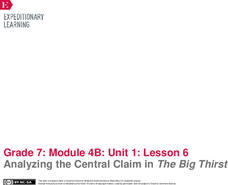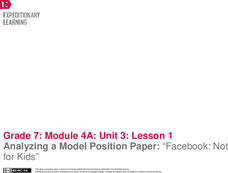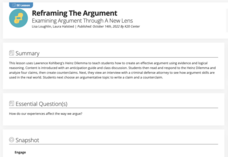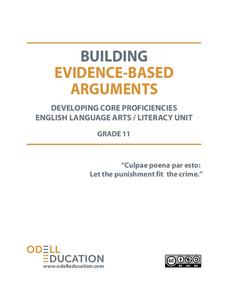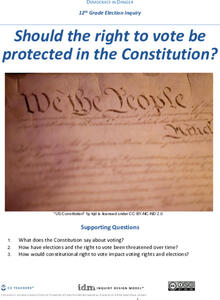EngageNY
Tracing and Evaluating Arguments: “The Future of Water” and The Big Thirst
Can scholars predict the future? They try as they first watch the video The Future of Water to capture details and trace the argument. Next, individuals complete the Tracing an Argument
note catcher to guide their thoughts. To finish,...
EngageNY
Analyzing the Central Claim in The Big Thirst
Quench the class's thirst for knowledge while building analytical skills. Scholars listen as the teacher reads excerpt from the book The Big Thirst. They then complete a close read and answer text-dependent questions from pages one...
K20 LEARN
Let Us Start The Lettuce Club (Or Not): Writing A Thesis Statement
Let us be frank! Writers learn that crafting a thesis statement is not that difficult if one peals back the layers. After watching several videos about the elements of a thesis, class members read the article "Lettuce Club helps students...
EngageNY
Grade 9 ELA Module 4, Unit 1, Lesson 24
Who bears the most responsibility for ensuring that goods are ethically produced? Using evidence drawn from Sugar Changed the World: A Story of Magic, Spice, Slavery, Freedom, and Science, the unit's central text, and from the...
National Woman's History Museum
Creating a Historical Thesis Statement
A strong thesis statement not only identifies the subject of an essay but also presents a claim that must be supported with evidence. After researching how nursing has evolved in the United States since the Colonial era, young writers...
EngageNY
Grade 9 ELA Module 4, Unit 1, Lesson 19
Building on the previous discussion of the supplemental reading article "Where Sweatshops Are a Dream," class members use the provided Evaluating Argument and Evidence Tool to identify the claims and evidence Nicholas Kristof uses to...
Turabian Teacher Collaborative
My Favorite Martian: Workshopping Warrants
Sometimes explaining an argument can lead to confusion and miscommunication. Narrow down the details in written arguments with a group activity in which learners pretend to be aliens from another planet, struggling to understand each...
EngageNY
Analyzing a Model Position Paper: “Facebook: Not for Kids”
It's time to take a position! Scholars learn to write a position paper by analyzing a model paper titled Facebook: Not for Kids. After studying the model paper, learners think about their own papers using the Position Paper Planner. They...
Bonneville
Titanium Dioxide Raspberry Solar Cell Data Sharing
Concerned about how well others did on the experiment? Scholars share results from the titanium dioxide raspberry solar cell test they performed in the previous lesson. After analyzing the data, they come up with a claim about the...
K20 LEARN
Reframing the Argument: Examining Argument through a New Lens
As part of a study of crafting compelling arguments, class members tackle the problem presented in Lawrence Kohlberg's "The Heinz Dilemma." After discussing the dilemma with classmates, writers draft an essay with a claim, support it...
Odell Education
Building Evidence-Based Arguments: "Cuplae poena par esto: Let the punishment fit the crime."
Should a criminal's punishment match the crime? An argumentative writing plan explores this question as class members investigate a variety of mixed-medium sources by experts in the field, form evidence-based claims, and support them...
CCSS Math Activities
Smarter Balanced Sample Items: High School Math – Claim 3
Communication is the key. A presentation provides 25 sample items for Claim 3, Communicating Reasoning, for the Smarter Balanced High School Math assessment. Items require pupils to answer the question and provide logical reasoning to...
CCSS Math Activities
Smarter Balanced Sample Items: 6th Grade Math – Claim 3
Communication is key. Eight sample items show how important communication and reasoning is for sixth grade mathematics. Part of the Claim 2-4 slide show series, the presentation uses concepts from fifth and sixth grade to illicit...
Museum of Tolerance
Developing Media Literacy
To protect young people from questionable content, many schools limit access. This resource suggests that because learners can so readily avail themselves to unrestricted Internet access, it is vital for 21st century learners to develop...
EngageNY
Grade 9 ELA Module 3, Unit 2, Lesson 10
Ninth graders continue their inquiry-based research projects focused on the topics in Temple Grandin's Animals in Translation. After formulating, honing, and adapting their research frames in the previous lessons, learners select...
EngageNY
Framing Lyddie’s Decision and Practicing Evidence Based Claims
Scholars grapple with whether the title character of Katherine Paterson's novel, Lyddie, should sign a petition about working conditions at the factory. They engage in close reading and discussion before adding their thinking about the...
EngageNY
End of Unit Assessment, Part 1: Revising Claims and Evidence Based on Feedback
Revisit, revise. Scholars receive their position papers returned with feedback from the teacher. They use colored pens to identify feedback related to the first two rows of the rubric and correct their papers based on the comments....
EngageNY
Forming a Research-Based Claim: Stakeholder Chart on Better Agricultural Water Management
How can industries manage water more sustainably? Building on the previous activity, scholars explore the topic by creating a stakeholder chart for agricultural water management. Next, they participate in the World Café discussion...
EngageNY
End of Unit Assessment, Part 1: Revising Claims and Evidence based on Feedback
What to do with all that feedback? Scholars use colored writing instruments to circle any feedback that relates to the first two rows of the grading rubric. After working on revisions for their papers, learners view the performance task...
Curated OER
Persuasive Elements
Investigate letters to the editor and their persuasive qualities. Break your class into reading groups and give each one a different article. As they read, they complete a graphic organizer to record their thoughts and opinions. There is...
K20 LEARN
Argument Is Everywhere: Introduction to Argument
C.E.R = Claim + Evidence + Reasoning. That's the framework behind building a solid piece of argument writing. Introduce young writers to this format with an engaging lesson that uses YouTube videos and a PowerPoint to illustrate the...
C3 Teachers
2020 Protests: Is There Anything New about the 2020 Protests?
Are marches and protests an effective form of resistance? That is the question high schoolers seek to answer in this inquiry lesson as they compare the 2020 protests to historical ones. Researchers use Venn Diagrams to compare images...
C3 Teachers
Democracy in Danger: Should the Right to Vote Be Protected in the Constitution?
High school seniors investigate what national, state and local rules say about voting. After examining the Constitution's articles, clauses, and amendments, researchers look at videos, listen to podcasts, and read articles to gather...
PwC Financial Literacy
Evaluating Financial Information
Advertising is all around us. Sometimes those advertisements are directed at young people, so it's important for youngsters to recognize false advertising and fraud when they see it. That's what this instructional activity is all about....



